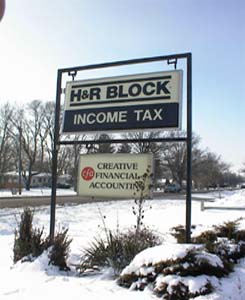|
"It's
never easy," Chip Schwarzentraub said. "You always
feel parents give the best care. But if you're in a
situation where you have to have child care, you want to be
comfortable with [a provider], and we are."
The
Schwarzentraubs initially enrolled Sloan at a day care that
was unlicensed, "but then we decided to switch,"
Schwarzentraub said.
One
of the reasons is that parents who use a licensed facility
can claim the expense on their income tax. "We're a
young couple and we thought that was something we needed to
take advantage of," Schwarzentraub added.
Once
realizing there was a licensing system in place, the
Schwarzentraubs consulted a friend who referred them to
Marcia Bidwell, a licensed child care provider in Lincoln.
From there they set up an interview with Bidwell, in the
child care environment. Stephanie Schwarzentraub contends
that they chose Bidwell because she seemed "agreeable
and would do what my husband and I wanted. Then we signed a
contract with her that let us lock in her rate and
times."

[Chip and Stephanie Schwarzentraub
seen here with their daughter Sloan, suggest visiting the
day care provider’s environment unannounced to see what
the facility is like.]
While
not required by DCFS, Bidwell decided to create her own
contract. "That's my policy. I write it all out so
people know what to expect," she said.
According
to DCFS in Springfield, there are stringent licensure
requirements to operate a day care facility. In fact, the 50
page, Licensing Standards for Day Care Homes explicates
everything from the maximum number of children who can be in
a single home to proper disciplining and nutritional needs
for each child.
Despite
the criteria, Bidwell, who has been a DCFS approved provider
for 16 years, said earning a license isn't all that
difficult.
"It's
not that hard—you just have to comply with DCFS," she
said. "They go over the whole thing with you. It's real
simple stuff, not hard at all."
When
discussing the criteria Bidwell explains, "everybody
has to have a physical for one thing. Then they make sure
you have smoke detectors and your [outlets] have safety
covers. You just fill in the paperwork; it's like applying
for a job."
After
the initial application a DCFS representative will make an
appointment to come to the day care providers home.
"For one thing," Bidwell adds, "DCFS makes
sure you have enough space."
Bidwell,
who currently cares for five children, said there are many
benefits to being DCFS-approved. "People know they're
not taking their child just anywhere. We also have access to
the state's food program (for which they're partially
reimbursed). Parents know their child is getting a balanced
and nutritious meal."
The
program benefits the provider in other ways too.
"We
can advertise if we're licensed," she said. "Also,
we can screen people just like they're screening us. I need
to know if a child can adapt to the children I already have.
They have to get along with me, too."

[Day
care provider Marcia Bidwell, holding Elise Patton, is
surrounded by from left to right: Derek Jacobs, Gage Vinson,
Sloan Schwarzentruber.]
Providers
who earn their license get another bonus: their own support
group, Community Child Care Connections. Newsletters are
sent out and group meeting are held in order to provide a
variety of activities which help generate new ideas for
child care providers. In addition, there are programs to
reimburse a child care provider for any additional training.
|

While
Bidwell and others in the Logan County area are approved day
care providers, those who are out of compliance are reported
to a hotline. Any reported problems stay on the day care
provider’s record for one year. This way Bidwell says,
"they can know the integrity of a person."
In
Logan County, approved providers aren't, however, parents'
only option. Another choice for school-age children is
School Age Child Care, which is administered by the Lincoln
YMCA. The hours are from 2 to 6 p.m., and it is held in all
five District 27 elementary schools plus West Lincoln-Broadwell
School.
"We're
not licensed because the school district is our governing
body," said YMCA Executive Director Angie Peters.
"That means we report to the school our participation
numbers and how things are going."
Jan
Schacht is the director of the program, which currently
cares for an average of 108 children per day.
The
goal of this program is to teach character development—caring,
respect, honesty and responsibility. Peters says,
"that's the national YMCA program. We also give them
snacks, work on their homework, play games, read, play
basketball, things like that."
In
addition to this program is a before-school program held in
the District 27 schools from 6:45 to 8:30 a.m. Chester-East
Lincoln School, meanwhile, has its own after-school program,
called Panther Camp.
[Ellen
Shawgo]
[Natalie
Jeckel - ed.]
Logan
County
child care providers |
|
Atlanta
Bonnie Lind, Gayla Smith, Kay Thaxton, Jeanette
Wilson |
|
Emden
Cherie Rankin, Diane Swart |
|
Hartsburg
Gwendolyn Langley, Sharon Leesman |
|
Lincoln
Day care nurseries:
Christian Child Care, Little Lambs Day Care, CIEDC
Head Start, Logan County Head Start-Prime Time,
Lincoln Christian Church Nursery School
Individuals: Julie Baxter, Jerry Berglin, Marcia
Bidwell, Mary Bossingham, Lonna Buss, Lisa Carpentier,
Christina Chronister, Brenda Dexter, Penny Dodds, Kim
Johnson , Joyce Jones, Julie Kastendick, Donna
Kessinger, Kim Koehne, Dawn Osborne, Teresa Rekart ,
Shelly Rogers, Deborah Seggelke, Sheila Sheley,
Carolyn Slater, Brenda Snyder, Kathleen Twente,
Christine Ward, Kathleen Twente, Christine Ward, Beth
Wright, Nancy Wright |
|
Mount
Pulaski
Stephanie Bruce, Kathy Davis, Melissa Nixon, Lisa
Shehorn |
|
New
Holland
Noah's Ark Nurturing Center, Traci Coers |
| This list, complete with addresses and
phone numbers, can be obtained from the Community
Child Care Connection by calling (800) 676-2805. As a
service to newcomers to Lincoln, the Lincoln-Logan
Chamber of Commerce also keeps a listing of licensed
providers who submit their name. |
|
|
Community
ownership needed by EDC
[FEB.
3, 2000] Lincoln,
what do you want to be when you grow up?
That is the question that Mark Smith, the director
of economic development for Lincoln and Logan County, is
trying to help answer.
Smith is trying to help the residents of Logan
County get to where they want to be and to make everything
in county the best that it can be.
|
|
The
mission of the Logan County Economic Development Council is
to enhance the economic climate and quality of life in Logan
County by mobilizing the talents and energies of business
enterprises, local governments and institutions to work in
partnership to achieve growth and prosperity for businesses
and job creation for Logan County citizens.
The governing board consists of a nine-member council
made up of officials from the city, county, chamber of
commerce and members at large.
Smith’s
innovation has included facilitating a number of focus
groups inside and outside of the city of Lincoln to gather
recommendations and comments from residents and businesses
about their desires for their county.
As part of his presentation Smith asks,
“What is good about your town?
What is not so good? What do you think we should
do?” Three
more questions that he asks are, “Where have we been? Where are we now? And, where will we be in the future?”

He
also listed the suggestions that he heard at least twice and
he will use this list to help formulate an economic plan or
a vision for Logan County.
Smith said, “I will find the best way to allocate
the city’s time, treasures and talents.”
Smith is not creating the vision but clarifying it,
based on the desires of the residents. “My job is to help Lincoln get to where it wants to be,”
he commented.
|

Some
of the recommendations are as follows: the need for more
higher paying jobs, the removal of tax caps, more parks and
open spaces, another 18-hole golf course and better building
maintenance. Improving streets and alley ways, enhancing the appearance of
several small communities, adding more housing options, and
larger conference and meeting facilities, along with working
to develop a public lake, are at the top of the list.
Smith
continued, “I
want all of the entities in the county--residents, the chamber
of commerce, school districts, churches, businesses,
industry and others--to take ownership in the future of
Logan County. But
first they must identify what it is they want. The next step
is to participate by asking, how can I help?
Any successful plan must be community owned.
It has to be a partnership.”
He
explained, “In the 1980s there were many negative changes
in the economic landscape as a result of plant closures and
job losses. We saw a lot of well-paying factory jobs leave
our community. Economic
development is a long-term, day to day process that involves
a lot of hard work.”
Marketing
and promotion is a large part of his job, and Smith added,
“Each time my telephone rings it increases the potential
for success. It
may be a business that is looking for a town to relocate and
maybe Lincoln will make their short list.”
[Kym
Ammons-Scott]
|
|
’Tis
the season to give
or…receive
[FEB.
2, 2000] With
W-2s flooding people’s mailboxes and only two months
until the April 15 deadline—the tax season is officially
upon us. According
to one Lincoln accountant, more people than ever will be
using electronic filing to get a refund fast.
|
|
"Internal Revenue is pushing to have more people
file electronically so we're offering it free to
everybody," said Clarence Barney of H & R Block.
"We're trying to get 85 percent of returns filed that
way."
Barney said other changes in the state tax laws are
few this year.
"There's $100 more child credit (from $400 to
$500) and the earned income credit is a little higher,"
he said.
Dale Meier of Meier Accounting and Tax Service
agreed. "There
are very few changes and the new ones are minor," he
said.
While this tax season has been virtually uneventful,
both men agreed that February is their busiest month.
"The W-2s started coming this week and my
calendar is booked for a few weeks," Meier said.
"The next three weeks are our busiest - the last
week in January and the first three in February," said
Barney. "You still get your procrastinators - some
people don't get in a big hurry because they don't need the
money."
Another local accountant who is swamped this month is
Mike Abbott of JM Abbott & Associates.
"We get very busy in February because farmers
are required to file March, and corporation taxes are due
March 15,” he said. “After
that, you always have your individual procrastinators, but
most clients are in by April."
One thing you can take to the bank is that early
filers are looking for a refund.
"This time of the year 90 percent of the people
get refunds and they want to get it fast,” Barney said.
The quickest way for people to get the refund is by
filing electronically.
“You can get your refund in your bank account in
two weeks,” Barney adds.
"Between
now and the first of March, it's all refunds," Meier
said. "After the first of March, 90 percent of the
people have to pay. They're in no hurry so they just wait.
There's some that will wait until April 15, but
three-fourths of those will file an extension.
They just don't want to let go of their money."
Abbott said his refund ratio is a little different.
|
"Of our clients now, probably half get refunds
and half have to pay," he said. "Our business
clients and our farmers usually owe money."
While people are eager to receive their money, many
filers don't bring all the paperwork needed to complete
their returns, Barney and Meier admitted.
"Most people are well prepared," Barney
said. "After you do their returns for a year, they
know what they need to bring.”
But sometimes after discussing their taxes
“problems they don't know they have” will originate.

Meier had a slightly different story.
In general, “very few people come in prepared,”
he stated. “The
ones I've had for awhile know what to bring, but some new
ones have to come in twice."
Over the years, Abbott has found a solution for
this problem.
"We send our clients an organizer and give them a
pre-appointment," he said. "It forces them to
get their stuff together before them come in."
[Ellen
Shawgo]
|



